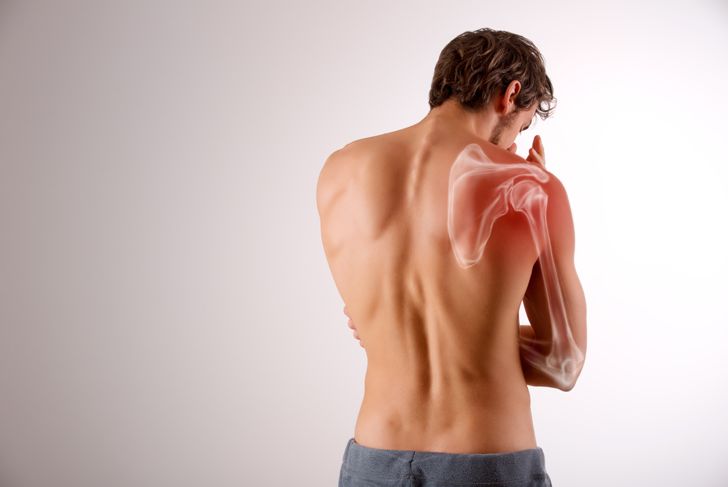The shoulder is one of the most mobile parts of the body and allows us to move around freely due to its full range of motion. Sometimes, however, this massive movement can increase the risk of suffering from a dislocated shoulder. Anyone can experience a dislocated shoulder, but people who are physically active are the most likely to become injured. Old people also have an increased risk of shoulder dislocation. If your shoulder becomes injured, it should be pretty obvious, but there might also be some more obscure symptoms. Find out the top ten symptoms of a dislocated shoulder.
Pain
The most common symptom (unsurprisingly) of a dislocated shoulder is pain, which is our body’s natural way of letting us know that something is wrong. In this case, pain is most often sudden and severe, especially during the moments following the injury. You’ll notice different degrees of pain depending on where the damage happens and more importantly how it happens. A light fall, for example, may temporarily dislocate the shoulder, but this can easily be fixed by your doctor. More severe cases might cause long-lasting symptoms which require rehabilitation and physical therapy.
Muscle Spasm
After an injury affecting the shoulder, the muscles surrounding this part of the body will usually spasm. This occurs because the body doesn’t want to injure the affected area further. You might find it difficult to move the shoulder; don’t try to move forcefully, as you may worsen the shoulder injury. Moreover, any movement will be painful because the muscles may become tighter, restricting muscle activity. The first step after injury is to receive medical evaluation; it’s vital to treat the injury to prevent further complications from developing. Even if you don’t feel pain, it’s a good idea to get a check-up.
Bone Dislocation
An important sign of shoulder dislocation is visible bone displacement, which creates a bulge that can be seen on the shoulder joint or in front of it. Not all cases of shoulder dislocation will produce visible symptoms, but most do. To check for injury, look for the ball part of the joint, which tends to pop after injury. This visible deformity is caused by the humeral head moving out of the glenoid fossa. Naturally, this causes a certain amount of pain to be felt, alongside other physical symptoms such as tingling, pins and needles, and a feeling of numbness.
Pins And Needles
After the immediate pain that follows shoulder injury, you are likely to experience a range of other physical symptoms. These include pins and needles, which are similar to what you might feel in a car after sitting down for a few hours. A feeling of pins and needles may develop in different parts of the shoulder as well as the arm. It is caused by damage to the nerves of the shoulder. Blood flow may also affect the intensity of the feeling. Depending on the severity of the case, you may notice discoloration throughout the arm and shoulder.
Numbness
Aside from a feeling of pins and needles around the shoulder, you may also experience other sensations, such as numbness. Numbness can range from mild to severe, meaning that you may even momentarily lose feeling altogether. Numbness can appear in a variety of different locations, such as the neck, arms, and chest. Due to the high degree of pain, the arm will become immobile until it is put back into place. Afterward, symptoms will persist until recovery takes place, which may take up to a few weeks depending on the extent of the injury.
Bruising
Bruising is one of the most common signs of dislocated shoulders, and is an important part of our body’s reaction to injury. This occurs when capillaries become damaged or broken, allowing for blood to escape into the surrounding area and tissue. Bruising doesn’t appear immediately; rather, it takes some time for it to develop, and will usually become visible a few hours after the injury occurs. Remember not to attempt to pop a dislocated shoulder into place yourself, and always seek medical attention to make sure further complications are avoided.
Popping Sound
If you experience a dislocated shoulder, you might notice a popping sound when moving the affected part of the shoulder. This is a strong indication of a dislocated shoulder. Be sure not to confuse a popping sound caused by a dislocated shoulder with that caused by releasing air from the joints. You can also detect a dislocated shoulder by examining the differences between the left and right shoulder; the injured shoulder may appear lower than the healthy one. To confirm a dislocated shoulder, a thorough medical examination will be done, including an x-ray. Then, physical rehabilitation will commence.
Vomiting
Even though the digestive system is located far away from the shoulder, it may be a significant indication of a dislocated shoulder. The body behaves in weird ways, and everything seems connected one way or another. Bone pain resulting from injury can cause systemic indications, therefore causing a range of symptoms to develop. One of the most important signs is vomiting, which may indicate a severe injury. You can also experience sweating as a result. In rare cases, you may pass out temporarily; this is known as vasovagal syncope.
Lightheadedness
The sheer shock of suffering from an injury as severe as a dislocated shoulder can cause you to become lightheaded. Lightheadedness can appear for a number of reasons, some psychological and others physical. Increase breathing is one essential element, and increased adrenaline levels may also cause lightheadedness. However, if the vagus nerve becomes stimulated, it can block the adrenaline response in the body, thereby causing the patient to pass out. While this is rare, it can happen. After an injury, ensure that you receive immediate medical attention and find a place to sit down.
Nausea
Nausea is one possible symptom of a dislocated shoulder. This – together with other symptoms like vomiting, sweating, and weakness – is a systemic sign of a dislocated shoulder. People have reported nausea after suffering a shoulder injury because of the increased adrenaline levels. If nausea is severe enough, it may lead to vomiting. To help bring down symptoms, you can suck on a small ice chip; drinking small amounts of water may also help. If you feel that symptoms don’t improve, ask your doctor if you can take anti-nausea medication to bring down symptoms.

 Home
Home Health
Health Diet & Nutrition
Diet & Nutrition Living Well
Living Well More
More




















